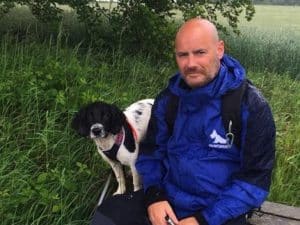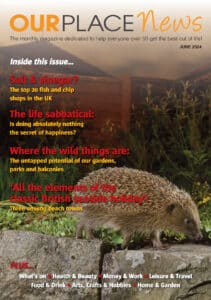When I left the Armed Forces after 22 years, I didn’t expect to be seeking shelter in the woodland just a couple of years later.

I arrived home in Perth, Scotland, in June 2012. I was 42 and was adjusting to civilian life. I got a job as a law enforcement officer and was enjoying being with my wife.
But when I was in a car accident in October, everything changed. I wasn’t badly injured in the crash, but the trauma of that impact triggered my PTSD – a common affliction with soldiers.
That one accident unlocked decades of memories I’d buried; the horrors of war, of seeing friends blown up into the pink mist, of
being held at gunpoint. I was having vivid nightmares, and flashbacks throughout the day – I was constantly on the edge of being triggered.
It was exhausting, and felt impossible to cope with – so, I turned to the bottle. I was constantly in and out of pubs, staying late, all in an attempt to drown my sorrows and dull my mind.
My wife wouldn’t stand for it – she gave me warnings to leave the drink alone and get help, but I didn’t – or couldn’t – listen. So, she ended things.
At the time, I didn’t know what was going on in my head, but I knew I wasn’t myself.
My marriage was over, I couldn’t work, and I didn’t have anywhere to live. I didn’t want to be in people’s way, so my solution was to move into a forest and live alone with my demons. I didn’t want to be a burden to anyone, so with the clothes on my back, my motorbike, and a tarpaulin, I retreated into the woodland.
It wasn’t until seven to eight months later, in October 2013, that a guy from SSAFA, a charity for veterans and people still serving in the Forces, came to see me and told me they’d help me with a cottage in Guildtown, a village in Perth.
It was completely empty when I moved in, but having a literal roof over my head felt like the first step in a positive direction. With their help, I got officially diagnosed with PTSD and started to receive treatment and therapy for it from the NHS.
This was also something that led me to Irma, my beautiful springer spaniel. A charity, Bravehound, got in touch and suggested I get a support dog – for company, as well as help with the difficult nights. Irma wakes me up when I’m reliving the trauma in my sleep. She’ll realise when I’m having a nightmare – so instead of having a full episode that lasts several minutes, within 30 seconds, she’ll wake me up by standing on my chest and licking my face.
Although I still struggle, I have an advantage over other people who have PTSD but not a dog like Irma – my nightmares are nowhere near as rough and stressful as they were without her.
However, having PTSD isn’t only a matter of my mental health – it’s affected me quite badly physically, as well. After the forest, I had painful fistulas in my bottom, as well as excruciating stomach aches.
When I went to hospital to have the fistulas removed, I was told I had Crohn’s disease, as well as type 2 diabetes. I was shocked, especially at the diabetes diagnosis – as an ex-soldier, I’d been physically fit for years.
My doctors suggested that Crohn’s disease was a result of the stress that PTSD had had on my body. I thought, ‘Oh, great – another thing.’
From then, it was a series of surgeries and health scares that nearly took my life.
I was in Perth Royal Infirmary from April 2016 until Christmas Eve 2018, most of it with Irma by my side. I had over 20 operations to
fix and remove various parts of my body, including taking out my large bowel. I had sepsis twice; the first time, I ended up in a coma and they only gave me 36 hours to live. My lungs were only working at 25%, and if they didn’t improve, they were going to turn off my machines.
Obviously, I came out of it, but because I wasn’t getting enough oxygen I woke up with brain damage – I have bad memory loss now, meaning I often don’t remember details of new people I meet, as well as people I knew years ago.
While in hospital, I had nothing but time to think about what my life looked like, and what I could do with it now that I was no longer serving, and wouldn’t be able to work a 9-5 because of my health.
I wanted to help others who were in my position. I posted a message to Twitter, under my old username ‘superj007’ telling people that I was ex-Forces and while I wasn’t qualified in PTSD training, I have experience and was there if anyone wanted to talk.
Nearly immediately, people started getting in touch – ex-squaddies, and police officers too. Sometimes, people would message me and say they were ‘going crazy’, or thinking of killing themselves.
I’d write back to them, or we’d get on the phone and I’d talk them through what they were feeling. I’ll say, ‘Look at me, mate – look what’s happened to me. I got through last week, I got through this week, so I’ll get through next week.’ That’s how to do it – one step at a time.
When the pandemic started, Scone Community Council asked for volunteer delivery people to get medicine to those who were vulnerable, elderly or living in rural areas. I was shielding with Irma, because of my health issues – but the squaddie in me thought ‘bugger that’! I knew I had to do something to help.
I’d just go to the chemist and pick up their medication – some of them were really important medications, for cancer, for example. I’d pack up my motorbike, strap Irma in, and off we’d go to drop it off.
For extra safety, I’d step back five metres and keep my crash helmet on. But even with that physical distance, it was so clear to see how much people were grateful for me and Irma stopping by. Some people lived alone, or far out in the country, so hadn’t seen people for weeks.
They loved me and Irma coming round, taking time to chat with them. I had a rapport with everyone I delivered to and made some genuine friends – I gave them my phone number and they’d start to call on me when they needed a trip to the bank, or to the train station when things opened up a bit more.
Before long, the operators at the council told me that people were asking for me to be their delivery man more than anyone else – I’m not sure if it was down to me, or because everyone loved Irma!
Then, out of the blue, I got a call from StoryTerrace, a memoir-writing organisation. They were putting together a special book on Unsung Heroes in the community, and one of the people I’d delivered to had put my name and number forward.
To this day, I have no idea who volunteered me but I’m so incredibly touched. I never expected to be in a book, telling my story, just for helping people – I did it because it seemed like the obvious thing to do.
Nowadays, I don’t do medicine deliveries but I’ll always be willing to hop on my bike or get in the car to do a favour for someone – I’m not up to much else after all. Though it seems small, I know a visit from me and Irma can make all the difference to someone’s day.
All the people who have helped me get through these years of PTSD mean so much to me – so I know that if I can do my bit to help someone else, it makes me happy.
I often think about this quote: ‘Helping one person might not change the world, but helping one person might change their world.’ That’s what I go by, and it’s something I think the world could do more of.
(Article source: Metro)

